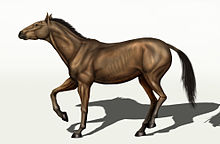Equus conversidens
| Equus conversidens Temporal range:
| |
|---|---|

| |
| Scientific classification | |
| Domain: | Eukaryota |
| Kingdom: | Animalia |
| Phylum: | Chordata |
| Class: | Mammalia |
| Order: | Perissodactyla |
| Family: | Equidae |
| Genus: | Equus |
| Subgenus: | incertae sedis |
| Species: | †E. conversidens
|
| Binomial name | |
| †Equus conversidens Owen, 1869
| |
| Synonyms | |
Equus conversidens, or the Mexican horse, is a dubious Pleistocene species of horse, now extinct, that inhabited North America.
The holotype of Equus conversidens, a partial palate, was unearthed in Pleistocene deposits northeast of Mexico City, Mexico. In January 1963, a partial skeleton was found in the city of Canyon, Texas in a white clay bed during the excavation of a basement, and was referred to E. conversidens by Dalquest and Hughes (1965), who interpreted the species as medium to small-sized, and added additional records of the species from Texas (including a skeleton from Slaton), Arizona, New Mexico, Oklahoma, Kansas and Florida, synonymizing Equus francisci, Equus tau, E. littoralis, E. achates, and E. barcenaei with E. conversidens.[3] However, Winans (1985) and MacFadden (1992) challenged the validity of E. conversidens due to its minimal diagnostic value, and treated E. francisci as valid.[4][5] Subsequent study confirmed the nomen dubium status of E. conversidens because the holotype was undiagnostic besides its small size.[6]
See also
References
- ^ a b c d Equus conversidens Owen, 1869 in GBIF Secretariat (2017). GBIF Backbone Taxonomy. Checklist dataset https://doi.org/10.15468/39omei accessed via https://www.gbif.org/species/4969230 on 2019-01-17.
- ^ a b c d e "†Equus conversidens Owen 1869 (horse)" (html). Fossilworks. Retrieved 17 January 2019.
- ^ Walter W. Dalquest and Jack T. Hughes, 1965. The Pleistocene Horse, Equus conversidens. American Midland Naturalist. 74(2):408-417 Published by: The University of Notre Dame. Stable URL: https://www.jstor.org/stable/2423270.
- ^ Winans, M.C. 1985. Revision of North American fossil species of the genus Equus (Mammalia:Perissodactyla:Equidae). Unpublished PhD dissertation. Austin: University ofTexas, Austin, Texas. 264 pp.
- ^ MacFadden, B.J. 1992. Fossil horses: systematics, paleobiology, and evolution of the family Equidae. Cambridge: Cambridge University Press. 369 p.
- ^ Heintzman, Peter D; Zazula, Grant D; MacPhee, Ross DE; Scott, Eric; Cahill, James A; McHorse, Brianna K; Kapp, Joshua D; et al. (2017). "A new genus of horse from Pleistocene North America". eLife. 6. doi:10.7554/eLife.29944 .
